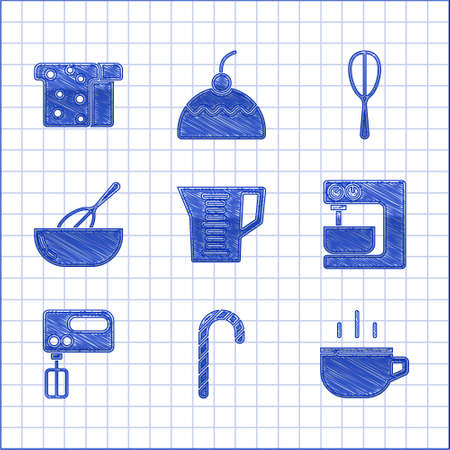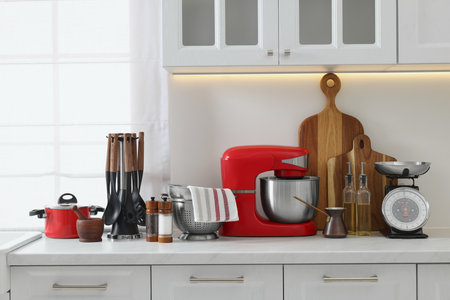1. Introduction: The Rise of Smart Kitchens
Technology has revolutionized the way we live, and the kitchen is no exception. Over the years, kitchen design has evolved from a purely functional space to a high-tech hub that enhances convenience, efficiency, and connectivity. With the rise of smart home technology, modern kitchens are now more intuitive and adaptable to our daily needs.
The Shift Towards Smart Kitchen Design
Traditional kitchens were designed with basic appliances and manual operations. However, advancements in technology have introduced smart devices that streamline cooking processes, improve energy efficiency, and even help with grocery management. The integration of Wi-Fi-enabled appliances, voice-controlled assistants, and automated features has transformed kitchens into intelligent spaces.
How Technology Enhances Kitchen Functionality
Smart kitchen innovations aim to make everyday tasks easier and more efficient. Here are some key ways technology has improved kitchen functionality:
| Feature | Benefit |
|---|---|
| Smart Refrigerators | Track food inventory, suggest recipes, and reduce waste. |
| Voice-Activated Assistants | Enable hands-free control for timers, recipes, and appliance settings. |
| Automated Faucets | Provide touchless operation to enhance hygiene and water conservation. |
| Wi-Fi-Connected Ovens | Allow remote monitoring and precise temperature control via smartphone apps. |
| AI-Powered Coffee Makers | Brew coffee based on personal preferences and schedules. |
The Growing Demand for Smart Kitchens
The increasing popularity of smart kitchens is driven by consumer demand for convenience and sustainability. Homeowners are investing in technologies that save time, reduce energy consumption, and create a seamless cooking experience. As smart home ecosystems continue to expand, kitchen designs will further evolve to incorporate cutting-edge innovations.
2. The Role of Smart Appliances
Modern kitchens are becoming more efficient and user-friendly thanks to smart appliances. These devices integrate cutting-edge technology to streamline cooking, improve food storage, and enhance overall convenience. From AI-powered ovens to voice-activated assistants, smart appliances are transforming the way we cook and interact with our kitchen spaces.
AI-Powered Ovens: Precision Cooking Made Easy
AI-powered ovens take the guesswork out of cooking. Equipped with sensors and machine learning capabilities, these ovens can recognize different types of food and adjust temperature and cooking time automatically. Some models even provide real-time monitoring through a mobile app, allowing users to check on their meals remotely.
Key Features of AI-Powered Ovens
| Feature | Benefit |
|---|---|
| Food Recognition | Automatically detects ingredients and adjusts settings for optimal results. |
| Remote Monitoring | Allows users to control and monitor cooking progress via smartphone apps. |
| Cooking Suggestions | Recommends recipes based on available ingredients. |
| Energy Efficiency | Uses precise heating to reduce energy consumption. |
Smart Refrigerators: More Than Just Cold Storage
Smart refrigerators do much more than keep food fresh. With built-in touchscreens, cameras, and internet connectivity, they help manage grocery lists, suggest recipes based on available ingredients, and even notify users when items are about to expire.
How Smart Refrigerators Improve Kitchen Efficiency
- Inventory Tracking: Built-in cameras allow users to check fridge contents remotely via smartphone apps.
- Recipe Suggestions: Suggests meal ideas based on stored ingredients.
- Voice Control: Compatible with virtual assistants like Alexa or Google Assistant for hands-free operation.
- Energy Management: Optimizes cooling settings to reduce energy consumption.
Voice-Activated Assistants: Hands-Free Help in the Kitchen
Voice-activated assistants like Amazon Alexa or Google Assistant bring added convenience to the modern kitchen. Whether setting timers, adjusting appliance settings, or providing step-by-step recipe guidance, these assistants make multitasking easier while cooking.
Common Uses for Voice-Activated Assistants in the Kitchen
- Setting Timers: Helps prevent overcooking or burning food.
- Controlling Smart Appliances: Adjust oven temperature or start a coffee maker using voice commands.
- Recipe Assistance: Reads out instructions while you cook.
- Managing Grocery Lists: Adds missing ingredients directly to a shopping list.
The integration of smart appliances into kitchen design is making daily cooking tasks more efficient and enjoyable. As technology continues to evolve, kitchens will become even more intuitive, offering greater convenience and enhanced culinary experiences.

3. Connectivity and the Internet of Things (IoT)
In modern kitchens, connectivity plays a crucial role in enhancing convenience and efficiency. With the rise of the Internet of Things (IoT), kitchen appliances can now communicate with each other, enabling seamless control through smartphones and smart home systems.
How IoT-Enabled Devices Improve Kitchen Efficiency
IoT technology allows homeowners to manage their kitchen appliances remotely, optimizing energy use and streamlining daily tasks. Whether its adjusting oven temperatures, monitoring refrigerator inventory, or setting up automated coffee brewing schedules, smart kitchens offer unprecedented levels of convenience.
Key Benefits of IoT in Smart Kitchens
| Feature | Benefit |
|---|---|
| Remote Control | Operate appliances from anywhere using a smartphone or voice commands. |
| Energy Efficiency | Smart systems optimize energy consumption, reducing utility costs. |
| Automated Cooking | Smart ovens adjust cooking times and temperatures for perfect results. |
| Inventory Management | Certain refrigerators track groceries and suggest recipes based on available ingredients. |
Seamless Integration with Smart Home Systems
The integration of kitchen devices with broader smart home ecosystems enhances user experience. Voice assistants like Amazon Alexa and Google Assistant allow hands-free control, while automated routines synchronize kitchen activities with daily schedules.
The Future of IoT in Kitchen Design
The evolution of IoT in kitchen design continues to advance, promising even smarter solutions. From AI-powered recipe suggestions to advanced food preservation technologies, the future of connected kitchens is all about making cooking more intuitive and effortless.
4. Sustainability and Energy Efficiency
As smart kitchen technology continues to evolve, sustainability and energy efficiency have become essential considerations in modern kitchen design. Smart appliances and connected systems help reduce energy consumption, minimize waste, and promote eco-friendly living.
How Smart Technology Enhances Energy Efficiency
Many smart kitchen appliances are designed to optimize energy use. From refrigerators that adjust cooling based on usage patterns to ovens that preheat efficiently, these innovations help homeowners lower their electricity bills while reducing their environmental impact.
Energy-Saving Features in Smart Kitchens
| Smart Appliance | Energy-Saving Feature | Benefit |
|---|---|---|
| Smart Refrigerators | Adaptive cooling based on usage | Reduces unnecessary energy consumption |
| Smart Ovens | Precise temperature control and rapid preheating | Lowers cooking time and energy use |
| Smart Dishwashers | Sensors detect load size and soil level | Optimizes water and electricity usage |
| Smart Lighting Systems | Motion sensors and scheduled lighting | Avoids unnecessary power consumption |
| Smart Faucets | Sensors regulate water flow | Lowers water wastage during use |
The Role of Automation in Reducing Waste
Apart from saving energy, smart technology also plays a significant role in reducing kitchen waste. Smart refrigerators with inventory tracking can notify users when food is nearing expiration, helping to prevent spoilage. Additionally, smart composting systems allow homeowners to turn food scraps into useful compost instead of sending them to landfills.
Sustainable Materials and Smart Design Choices
Sustainability in modern kitchens goes beyond just smart appliances. Many homeowners are opting for eco-friendly materials such as recycled countertops, bamboo cabinetry, and energy-efficient LED lighting. When combined with smart technology, these choices contribute to an overall greener kitchen environment.
The Future of Sustainable Smart Kitchens
The integration of AI-driven automation and renewable energy sources will continue shaping the future of sustainable kitchen design. As technology advances, we can expect even more intelligent systems that further reduce resource consumption and make eco-friendly living easier than ever.
5. Future Trends in Smart Kitchen Design
As technology continues to evolve, the future of smart kitchens is set to be even more advanced, efficient, and personalized. From AI-driven cooking solutions to fully automated kitchen systems, innovation is shaping how we interact with our kitchen spaces.
AI-Driven Cooking Solutions
Artificial intelligence is transforming the way we cook by offering intelligent recipe suggestions, real-time cooking assistance, and even automated meal preparation. Smart ovens with AI-powered sensors can adjust cooking times and temperatures based on the food being prepared, ensuring perfect results every time.
Automation in the Kitchen
Fully automated kitchen appliances are becoming more common, reducing the need for manual operation. From robotic arms that chop vegetables to self-cleaning appliances, automation aims to make cooking and cleanup effortless.
Examples of Kitchen Automation
| Feature | Description |
|---|---|
| Smart Refrigerators | Automatically track food inventory and suggest recipes based on available ingredients. |
| Robotic Cooking Assistants | Prepare meals by following programmed recipes with precise ingredient measurements. |
| Self-Cleaning Appliances | Ovens and dishwashers equipped with self-cleaning technology reduce maintenance efforts. |
Personalized Kitchen Experiences
The future of smart kitchens will focus on personalization. Appliances will adapt to user preferences, remembering favorite recipes, preferred cooking styles, and dietary restrictions. Smart coffee makers, for instance, will prepare coffee exactly how you like it at your preferred time each morning.
The Role of Connectivity and IoT
The Internet of Things (IoT) will further enhance smart kitchens by enabling seamless communication between devices. Imagine a kitchen where your fridge communicates with your oven to preheat for a recipe or alerts you when groceries need replenishing.
Key Benefits of IoT in Kitchens
- Energy Efficiency: Smart appliances optimize energy use based on real-time data.
- Convenience: Remote control and voice activation make kitchen tasks easier.
- Sustainability: Waste-reducing technologies help minimize food spoilage.
The future of smart kitchens is all about making cooking more intuitive, efficient, and enjoyable. With advancements in AI, automation, and connectivity, homeowners can expect their kitchens to become highly responsive spaces tailored to their needs.


